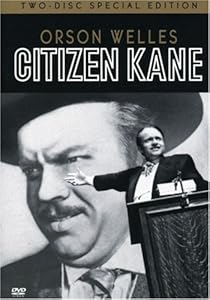 Cover of Citizen Kane (Two-Disc Special Edition)
Cover of Citizen Kane (Two-Disc Special Edition)Polls of critics and filmmakers
| The examples and perspective in this article may not represent a worldwide view of the subject. Please improve this article and discuss the issue on the talk page. (August 2010) |
- Every decade, the British film monthly Sight & Sound asks an international group of film professionals to vote for their greatest film of all time. The Sight & Sound accolade has come to be regarded as one of the most important of the "greatest ever film" lists. Roger Ebert described it as "by far the most respected of the countless polls of great movies--the only one most serious movie people take seriously."[1] The first poll, in 1952, was topped by Bicycle Thieves (1948).[2]
- Orson Welles' Citizen Kane (1941) has been voted number one in each of the last five Sight & Sound polls. A separate poll of established film directors, held for the first time in 1992, has also placed Citizen Kane at the top.[2] The film was selected as number one in a Village Voice and in a Time Out critics' poll. It was listed as the greatest American film by the American Film Institute in both the first (1998) and second (2007) versions of its 100 Years... 100 Movies list.
- The Searchers (1956) is the film most often mentioned in a poll of the favorite films of directors by German language Steadycam magazine in 1995.[3]
- Tokyo Story (1953) by Yasujirō Ozu topped a critics' poll conducted by Asian film magazine Cinemaya in 1998. It was followed by Satyajit Ray's Pather Panchali (1955) and Kenji Mizoguchi's Ugetsu (1953) tied at second place.[4]
- La Règle du Jeu (The Rules of the Game) (1939) by director Jean Renoir was named the greatest film by the French film magazine Positif in 1991.[5] It also holds the second slot in the Village Voice poll,[6] and is one of only two movies to have appeared in every one of the Sight & Sound polls.[citation needed]

Not the real Harry Knowles.
The real Harry Knowles.
His website.
Quote whores.
No comments:
Post a Comment